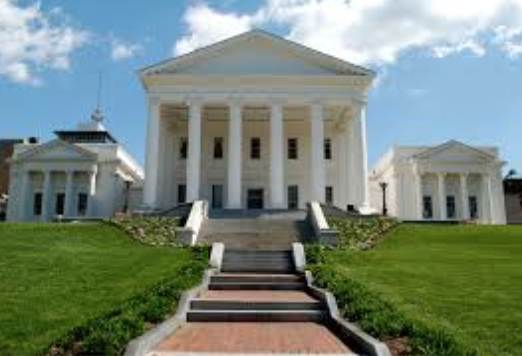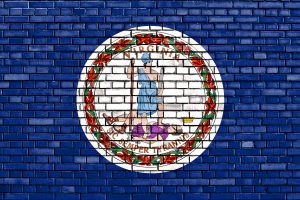 The recent election in Virginia had the highest voter turnout in two decades for a gubernatorial race (which occur in off-years) and brought the balance of power in the House of Delegates to a nearly even split between Republicans and Democrats. What does that mean for statewide energy efficiency policies and initiatives? As we continue to analyze the scenarios, we are actively engaging with the next Governor and his transition team.
The recent election in Virginia had the highest voter turnout in two decades for a gubernatorial race (which occur in off-years) and brought the balance of power in the House of Delegates to a nearly even split between Republicans and Democrats. What does that mean for statewide energy efficiency policies and initiatives? As we continue to analyze the scenarios, we are actively engaging with the next Governor and his transition team.
These are our first thoughts on what to expect:
- Both Governor-elect Ralph Northam and Attorney General Mark Herring currently hold statewide office, which means there won’t be a steep learning curve on all topics all at one time.
- Northam has been lauded as an environmental and clean energy champion, with strong backing from the Virginia League of Conservation Voters among others. Energy efficiency isn’t necessarily his “pet project,” but we expect to find an open ear given his stance on related issues and statements like this: “Dr. Northam, as a scientist, understands the importance of energy efficiency. As a state senator, Northam supported stricter energy efficiency standards, including incentivizing companies to invest in energy efficient programs. He believes energy efficiency not only helps to combat environmental damage and climate change, but also makes business sense by saving homeowners and businesses energy costs.”
- With a plethora of new members in the House of Delegates, there is an opportunity to educate them on key energy efficiency policies.
- Depending on recounts, there will be 4-6 new members on the House Commerce and Labor committee, which reviews all energy legislation. VAEEC will be working with the new and returning members to educate them on the value of energy efficiency in the Commonwealth, including resuming our site visits with legislators in the spring. We led two successful tours in October which you can read about here. We’ll also share with all incoming legislators our new series of short videos on key EE policies. Watch those here.
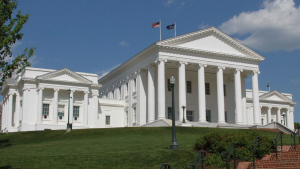 VAEEC will continue to advocate for the Governor elect to build on the progress being made by Governor McAuliffe — who we recently honored with an Award of Excellence for his leadership and support of energy efficiency in the Commonwealth — on carbon regulations, which include a 5% carve out for EE programs.
VAEEC will continue to advocate for the Governor elect to build on the progress being made by Governor McAuliffe — who we recently honored with an Award of Excellence for his leadership and support of energy efficiency in the Commonwealth — on carbon regulations, which include a 5% carve out for EE programs.
Stay tuned for more insight into how the political landscape is shaping up for our energy efficiency priorities in Virginia, including a briefing on the upcoming General Assembly session in January.
Make sure you are signed up for our monthly e-newsletters (contact info@vaeec.org) and like us on Facebook and follow us on Twitter to keep up to speed.
Industry Often in the Shadows Drives $1.5B in Revenue and 75,000 Jobs
Richmond, Virginia (May 19, 2017) — Virginia’s economy is stronger thanks to the role of energy efficiency, according to a new report released today by the Virginia Energy Efficiency Council (VAEEC) that finds the industry drives $1.5B in annual revenue and accounts for more than 75,000 jobs. The full report, “Why Energy Efficiency is a Smart Investment for Virginia,” is available at www.vaeec.org/data and was presented at the VAEEC spring meeting in Richmond. The report lays out five specific policy recommendations that will not only help the industry continue to grow but will also play a role in future carbon reduction strategies the Commonwealth may pursue.
“With uncertainty about the future of energy efficiency policies and resources at the federal level, it is more important than ever for states to recognize the enormous potential of energy efficiency to advance smart energy solutions,” said Chelsea Harnish, VAEEC Executive Director. “The VAEEC’s 80+ members prove to us everyday that energy efficiency has tremendous potential to drive economic growth, create jobs, shrink utility bills, conserve natural resources, and reduce pollution. Our report outlines an ambitious plan to tap that potential.”
In 2013, the VAEEC released the first-ever census report documenting the energy efficiency industry in the Commonwealth. Our newest report shows that revenue generated from the energy efficiency sector has grown from nearly $300 million in 2013 to $1.5 billion in 2016. The U.S. Department of Energy has found that the industry is responsible for 75,000 jobs across the state.
The report offers five policy recommendations, specifically addressed to the incoming Governor, deemed “the smartest, fastest, most effective routes we can take to put Virginia on the path toward a clean energy future and stronger economy.” They are:
- Expand utility energy efficiency program opportunities in Virginia
- Support the adoption of Commercial Property Assessed Clean Energy (C-PACE) financing across the Commonwealth
- Adopt rigorous energy building codes for new home construction without weakening amendments
- Expand performance-based contracting for state-owned buildings and public institutions of higher education
- Provide and support opportunities for benchmarking of state, local and commercial buildings
According to the most recent update to the Virginia Energy Plan, each of these policy recommendations are critical for Virginia to meet our energy efficiency goal of 10% electricity savings by 2022. The final report from the Executive Order 57 Working Group, which was released this week as well, also highlights the the important role energy efficiency can play in reducing carbon pollution. Two of the five recommendations made by the Working Group are specific to the energy efficiency industry: 1) Updating state building codes to reflect current technology and standards and 2) Developing an energy efficiency accounting and registry tool.
The report pairs each recommendation with a case study of that policy in action, including:
- Project:HOMES weatherized a veterans housing complex in Richmond through Dominion’s Energy Share program
- The Virginia Center for Housing Research at Virginia Tech found that multi-family apartments that were built to EarthCraft, above building code, standards saved families $650 a year.
- The Virginia Department of Corrections integrated Energy Performance Contracting into their building operations to cut costs
- A Property Assessed Clean Energy (PACE) financed project at a retirement community in neighboring Kentucky is expected to achieve 37% energy savings
- In Arlington County, commercial property owners participated in a voluntary benchmarking program competition, which resulted in millions of dollars in cost savings
“This report should open a dialogue among energy efficiency stakeholders, policymakers, regulators, businesses, and local and state government agencies about how best to augment the implementation of energy efficient technologies and services,” said David Steiner of D+R International and Chair of the VAEEC Board of Directors. “The many benefits to consumers, property owners, ratepayers, local and state governments, and industry warrant aggressive adoption of best practices to implement energy efficiency throughout the Commonwealth, from the kitchen electrical outlet to the power grid.”
Contact: Chelsea Harnish, VAEEC, 804.457.8619
The short 2017 Virginia General Assembly is now in session. The VAEEC has taken the following positions on energy efficiency-related bills up for consideration:
VAEEC supports HB 1465 (Sullivan)/ SB 990 (Dance)– Requires DMME or GEC to continue tracking progress towards 10% energy reduction goal (SB 990 passed out of committee 1/23 and is headed to the Senate floor; HB 1465 will be in the energy subcommittee of Commerce and Labor on 1/31; SB 990 passed out of the Senate on 1/31 and will go to the House; HB 1465 was passed by indefinitely on 1/31; SB 990 passed out of the House on 2/17).
VAEEC supports HB 1712 (Minchew)– ESCO coalition bill; amends language on cooperative procurements related to energy performance contracts (Passed out of subcommittee unanimously week of 1/16; passed out of the General Laws committee unanimously on 1/24; will go to the full House for a vote during the week of 1/23; passed out of the House on 1/31 and will go to the Senate).
VAEEC opposes HB 1658 (Marshall)– Anti-benchmarking bill; prohibits third party access to data without consumer consent. This bill will not change current law since third parties cannot access consumer data without the consumer’s consent. After convening a workshop on benchmarking that included VAEEC, several of our members and board members and other interested parties — such as property managers, legislators and homebuilders — the Department of Mines, Minerals and Energy (DMME) plans to continue those conversations over the course of the year in the hopes of coming to consensus on what a benchmarking program could look like in Virginia. We advocate allowing that process to develop a consensus-based approach to the data access/benchmarking issue instead of preemptively preventing it.
This bill was passed by indefinitely in the subcommittee with a letter to DMME asking them to convene a stakeholder group to discuss the issue of data access.
Stay tuned for updates.
Through the Governor’s Executive Council on Energy Efficiency (GEC), the VAEEC was tasked with leading a working group on consistent messaging to help utility and private providers in the Commonwealth deliver similar messages to consumers regarding energy efficiency benefits and programs.
Numerous energy efficiency resources and programs are currently available, which often leads to consumer confusion. Therefore, the goal was to create recommendations to help develop consistent, actionable messaging stakeholders can use to make the energy efficiency education process more effective and to reduce that confusion.
The working group convened three times to:
- Review message testing results (you can see the Virginia Energy Sense presentation on research here)
- Discuss energy efficiency-focused programs happening throughout Virginia and other states (you can watch the webinar from one of the meetings with a presentation by Brian Blackmon with the Knoxville TN Sustainability Office), and
- Create a list of best practices.
These meetings resulted in the development of six recommendations, which were presented to the GEC.
All six recommendations were carefully crafted with the objective to help consumers become better educated about their energy efficiency options, save money, and improve their health and safety while further advancing energy efficiency throughout the Commonwealth. Creating more effective partnerships among energy efficiency stakeholders and between these stakeholders and other consumer advocacy groups is a resounding theme among the recommendations. While it is vital for energy efficiency stakeholders to better communicate and work with each other, we should also partner with health and safety and low-income assistance groups who tend to already have positive relationships with consumers.
VAEEC worked with the members of this group to finalize all six recommendations and presented them to the Governor’s Executive Committee on Energy Efficiency in 2017.
 On January 10, 2017, VAEEC and LEAP made the case for Virginia adopting the model energy codes for new buildings before the EO-57 Working Group. This is a group convened by Secretary of Natural Resources Molly Ward per Governor McAuliffe’s Executive Order 57 in the summer of 2016; the group is charged with recommending concrete steps to reduce carbon pollution from Virginia’s power plants using existing authority; a public comment period is open through April 30.
On January 10, 2017, VAEEC and LEAP made the case for Virginia adopting the model energy codes for new buildings before the EO-57 Working Group. This is a group convened by Secretary of Natural Resources Molly Ward per Governor McAuliffe’s Executive Order 57 in the summer of 2016; the group is charged with recommending concrete steps to reduce carbon pollution from Virginia’s power plants using existing authority; a public comment period is open through April 30.
You can download our full presentation here. Learn more about EO-57 and submit your comments here.
Our case was greatly strengthened by the fact that two of the day’s six other presenters also recommended building codes as among the most cost-effective strategies for minimizing greenhouse gas emissions. They mentioned codes as preferred options, and we got into the details of how Virginia’s code update process works, where Virginia deviates from the model codes and what that costs new homebuyers, and how the Working Group’s representatives might intervene. We included data suggesting that even improved compliance with the current code would obtain real benefits for emissions reductions and for new homebuyers.
Our specific recommendations were as follows:
- Provide guidance to DEQ and DMME staff regarding how to participate in code update process (e.g., submit comments, support amendments).
Create an ex-officio seat for DMME staff on the Board of Housing and Community Development.
- Direct DHCD and DMME to enter into an MOU for information sharing.
- Ensure that it is the policy of DHCD to provide expert guidance regarding building science to inform the code update process.
- Fund/support a study of compliance with current codes.
The triennial update to Virginia’s building codes is an administrative process managed by the Department of Housing and Community Development and involving many stakeholders. Energy conservation is still considered a relatively minor issue by many of the current participants in this process. The VAEEC is committed to educating all participants about the many benefits of adopting and enforcing rigorous energy codes.
As we pointed out, strong codes are a win for:
- Environmental policy (global warming, resource use)
- Energy policy (costs, grid stability, predictability)
- The construction industry (deliver a more valuable, higher-quality product
- The mortgage industry (32% less risk of default (IMT/UNC report)
- Local jobs (framing and insulating don’t happen overseas)
- Affordable housing (lowers total cost of housing and increases predictability of monthly costs)
- Home buyers/renters of all kinds (comfort, savings, predictability, air quality)
Not to mention people want it. A 2013 survey by the National Association of Homebuilders reports that 9 out of 10 homebuyers are willing to pay 2-3% more for a home that includes permanent energy efficiency features.
You can dig deeper into building codes in our October 2016 blog post “The impact and next steps of Virginia’s Board of Housing and Community Development on building codes” or by watching our December 2016 webinar “Building Codes as Energy Efficiency Driver in Virginia.”
VAEEC staff and members will continue to advocate for advanced energy codes in Virginia through the coming year.
Chelsea Harnish is VAEEC Executive Director.
Andrew Grigsby is Executive Director of the Local Energy Alliance Program (LEAP) and a member of the VAEEC Governance Board.
Winners Honored by Virginia Energy Efficiency Council (VAEEC) and Governor McAuliffe at Richmond reception
Photos from the awards ceremony can be found on our Facebook page and Google Drive.
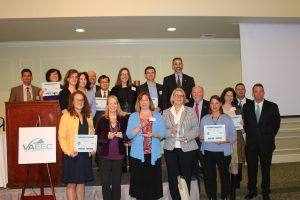 Richmond, Virginia (November 29, 2016) – The Virginia Energy Efficiency Council (VAEEC) honored the winners of its first-ever Virginia Energy Efficiency Awards at a reception in Richmond tonight attended by Governor Terry McAuliffe. VAEEC received more than 50 nominations for the 6 awards which showcase how energy efficiency champions across the Commonwealth are helping businesses, schools, government and homeowners save money on energy expenditures while reducing energy consumption — all while stimulating job growth and our economy.
Richmond, Virginia (November 29, 2016) – The Virginia Energy Efficiency Council (VAEEC) honored the winners of its first-ever Virginia Energy Efficiency Awards at a reception in Richmond tonight attended by Governor Terry McAuliffe. VAEEC received more than 50 nominations for the 6 awards which showcase how energy efficiency champions across the Commonwealth are helping businesses, schools, government and homeowners save money on energy expenditures while reducing energy consumption — all while stimulating job growth and our economy.
“Congratulations to all of the Virginia Energy Efficiency Leadership Awards winners, and thank you for your contributions to the new Virginia economy,” said Governor Terry McAuliffe, who presented all 18 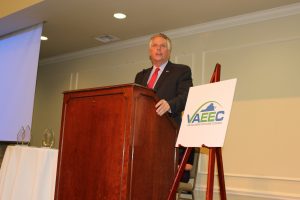 winners with their awards. “Tonight we recognize your achievements and celebrate the tremendous progress that we are making together on energy efficiency in the Commonwealth. Thank you to the Governor’s Executive Committee on Energy Efficiency for creating this vision and to the Virginia Energy Efficiency Council for pursuing that vision and supporting an industry that is vital to helping build a new Virginia economy.”
winners with their awards. “Tonight we recognize your achievements and celebrate the tremendous progress that we are making together on energy efficiency in the Commonwealth. Thank you to the Governor’s Executive Committee on Energy Efficiency for creating this vision and to the Virginia Energy Efficiency Council for pursuing that vision and supporting an industry that is vital to helping build a new Virginia economy.”
“The winning entries are proof that energy efficiency has tremendous potential to drive economic growth, create jobs, shrink utility bills, conserve natural resources and reduce pollution. They reflect the preliminary numbers from our 2016 Clean Energy Census which indicate that building energy efficiency alone accounts for $1.1B in annual revenue,” said Chelsea Harnish, VAEEC Executive Director.“We are pleased to use these awards to shine a spotlight on innovative approaches, positive impacts in our communities, unique partnerships and replicable and scalable programs. Congratulations to the winners and thanks to all 50+ applicants.”
Any person, entity or group who works on energy efficiency in Virginia was eligible for the Awards which were chosen by a Selection Committee, comprised of members of the VAEEC Education and Outreach Committee and additional volunteer members of VAEEC.
Winners: 2016 Virginia Energy Efficiency Leadership Awards
Academic
1st Place: Manassas Park Elementary School & Pre-Kindergarten
Submitted by 2rw Consultants, Inc.
2nd Place (tie): Get2Green
Submitted by Fairfax Public Schools
Henry County Public Schools
Submitted by Henry County Public Schools
Commercial
1st Place: Development of PACE Financing in Virginia
Submitted by Abacus Property Solutions, Virginia Community Capital, and McGuireWoods Consulting
2nd Place: Ballston Garage LED Retrofit
Submitted by Arlington County
3rd Place: Exact Energy Inc.
Submitted by Exact Energy, Inc.
Local Government
1st Place: Henrico County
Submitted by Henrico County
2nd Place: City of Virginia Beach
Submitted by City of Virginia Beach
3rd Place: Fontaine Fire Station
Submitted by 2rw Consultants, Inc.
Low-Income
1st Place: Live Stream Distance Learning Energy Efficiency Project
Submitted by Community Housing Project
2nd Place: Appalachian Power Company (APCO)
Submitted by Association of Energy Conservation Professionals
3rd Place: Arlington-Alexandria Energy Masters
Submitted by Arlington Alexandria Office of the Virginia Cooperative Extension, Arlingtonians for a Clean Environment, and Arlington Thrive
Residential
1st Place: WarmWise Web-Based Home Audit Program
Submitted by Columbia Gas of Virginia and Richmond ARC
2nd Place: 1922 Blair Street
Submitted by Bain-Waring Home Energy Remodeling, RIC Design Build, and Richmond Region Energy Alliance
3rd Place: Alexandria Renew Enterprises
Submitted by AlexRenew
State Government
1st Place: Virginia Department of Corrections
Submitted by the Virginia Department of Corrections
2nd Place: Department of Mines, Minerals and Energy Division of Energy
Submitted by the Department of Mines, Minerals and Energy Division of Energy
3rd Place: Department of Mines, Minerals and Energy
Submitted by the Department of Mines, Minerals and Energy
Academic
Manassas Park Elementary School & Pre-Kindergarten
Submitted by 2rw Consultants, Inc.
 The new Manassas Park Elementary School and Pre-Kindergarten were built with the goal to create a campus that was not only environmentally sustainable but that was also a resource to teach students about environmental stewardship. The buildings are designed to meet the American Institute of Architects (AIA) 2030 Challenge and use 50% less energy than code-compliant schools. Features include photo-sensors, which activate artificial light only when needed to supplement natural lighting; ground-source heat pumps, variable-speed pumping, pre-treatment and total energy recovery for ventilation air; natural ventilation; rainwater harvesting; low-consumption fixtures and kitchen equipment.
The new Manassas Park Elementary School and Pre-Kindergarten were built with the goal to create a campus that was not only environmentally sustainable but that was also a resource to teach students about environmental stewardship. The buildings are designed to meet the American Institute of Architects (AIA) 2030 Challenge and use 50% less energy than code-compliant schools. Features include photo-sensors, which activate artificial light only when needed to supplement natural lighting; ground-source heat pumps, variable-speed pumping, pre-treatment and total energy recovery for ventilation air; natural ventilation; rainwater harvesting; low-consumption fixtures and kitchen equipment.
Commercial
Development of PACE Financing in Virginia: 1st Place
Submitted by Abacus Property Solutions, Virginia Community Capital, and McGuireWoods Consulting
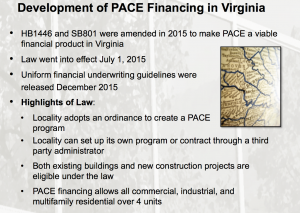 The team was largely responsible for fixing the flawed Property Assessed Clean Energy (PACE) legislation in 2015, which previously did not give the PACE lien priority over existing mortgage holders. Through their efforts, the PACE legislation passed easily – where previous years’ efforts to modify the statute failed – with very little opposition in the General Assembly. Since the legislation went into effect in July 2015, the team has been active in building interest, support and knowledge of the value proposition of PACE throughout the state.
The team was largely responsible for fixing the flawed Property Assessed Clean Energy (PACE) legislation in 2015, which previously did not give the PACE lien priority over existing mortgage holders. Through their efforts, the PACE legislation passed easily – where previous years’ efforts to modify the statute failed – with very little opposition in the General Assembly. Since the legislation went into effect in July 2015, the team has been active in building interest, support and knowledge of the value proposition of PACE throughout the state.
Local Government
Henrico County: 1st Place
Submitted by Henrico County
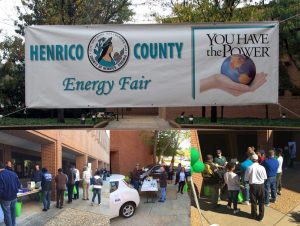 The mission of Henrico County’s Energy Management program and energy manager is to develop Henrico County Government and Schools as the leading local authorities for sustainable energy use and to promote the importance of good energy management for the economic and environmental well-being of the county’s residents and employees. The Energy Management program also strives to improve energy education and foster a culture of efficiency and sustainability in the County, while the Energy Manager supports green design and construction efforts for capital projects. Completed projects include energy audits, HVAC and lighting system upgrades, participation in demand response programs, commissioning and retro-commissioning, traffic and street light upgrades, building automation systems, and construction of a 4-megawatt methane gas to electricity generator at the landfill.
The mission of Henrico County’s Energy Management program and energy manager is to develop Henrico County Government and Schools as the leading local authorities for sustainable energy use and to promote the importance of good energy management for the economic and environmental well-being of the county’s residents and employees. The Energy Management program also strives to improve energy education and foster a culture of efficiency and sustainability in the County, while the Energy Manager supports green design and construction efforts for capital projects. Completed projects include energy audits, HVAC and lighting system upgrades, participation in demand response programs, commissioning and retro-commissioning, traffic and street light upgrades, building automation systems, and construction of a 4-megawatt methane gas to electricity generator at the landfill.
Low-Income
Live Stream Distance Learning Energy Efficiency Project: 1st Place
Submitted by Community Housing Project
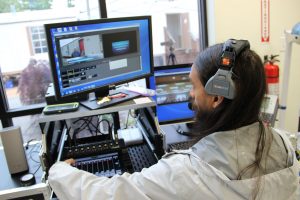 Community Housing Partners’ (CHP) innovative energy efficiency training project involved a live broadcast from a manufactured home in Virginia to the statewide Weatherization Assistance Program (WAP) conference in Minnesota. Having been a WAP provider for 40 years, CHP knows firsthand the importance of equipping WAP crew members with the knowledge, skills, and abilities to produce quality work resulting in maximum energy savings for the low-income households served by the program. CHP developed a 3.5 hour live-stream training session with relevant predefined topics and real-time Q&A, which enabled CHP to develop a new approach to energy efficiency training that will be replicated nationally, and potentially internationally.
Community Housing Partners’ (CHP) innovative energy efficiency training project involved a live broadcast from a manufactured home in Virginia to the statewide Weatherization Assistance Program (WAP) conference in Minnesota. Having been a WAP provider for 40 years, CHP knows firsthand the importance of equipping WAP crew members with the knowledge, skills, and abilities to produce quality work resulting in maximum energy savings for the low-income households served by the program. CHP developed a 3.5 hour live-stream training session with relevant predefined topics and real-time Q&A, which enabled CHP to develop a new approach to energy efficiency training that will be replicated nationally, and potentially internationally.
Residential
WarmWise Web-Based Home Audit Program: 1st Place
Submitted by Columbia Gas of Virginia and Richmond ARC
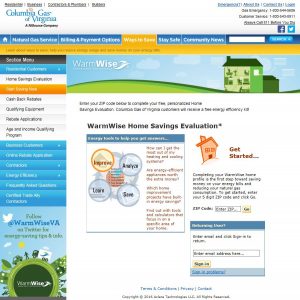 Columbia Gas of Virginia’s Web-Based Home Audit Program allows residential customers to participate in their own energy analysis and places them in the “driver’s seat” of achieving an energy efficient future. Customers participating in an online home energy audit receive a customized report recommending home improvements that can be implemented to reduce natural gas usage. Through the end of 2015, CGV’s customers have achieved over $4M in savings through the program.
Columbia Gas of Virginia’s Web-Based Home Audit Program allows residential customers to participate in their own energy analysis and places them in the “driver’s seat” of achieving an energy efficient future. Customers participating in an online home energy audit receive a customized report recommending home improvements that can be implemented to reduce natural gas usage. Through the end of 2015, CGV’s customers have achieved over $4M in savings through the program.
State Government
Virginia Department of Corrections: 1st Place
Submitted by the Virginia Department of Corrections
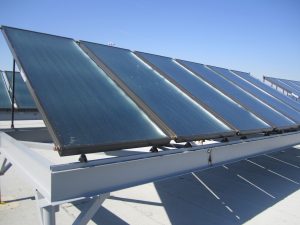 The Virginia Department of Corrections (VADOC) executed the first executive branch energy services contract (ESCO) in Virginia, leads Virginia in ESCO volume, and has embraced ESCOs as an integral part of its building renewal program. VADOC has also tied energy efficiency to its public safety mission by creating an inmate training program in energy sector skills. Additionally, VADOC employs a broad fuel portfolio including renewable and alternative energy sources
The Virginia Department of Corrections (VADOC) executed the first executive branch energy services contract (ESCO) in Virginia, leads Virginia in ESCO volume, and has embraced ESCOs as an integral part of its building renewal program. VADOC has also tied energy efficiency to its public safety mission by creating an inmate training program in energy sector skills. Additionally, VADOC employs a broad fuel portfolio including renewable and alternative energy sources
About the VAEEC
The Virginia Energy Efficiency Council is the voice for the energy efficiency industry in the Commonwealth. Our members include Fortune 500 companies, universities, nonprofits, local governments, state agencies, and utilities. The Council’s goal is to ensure that energy efficiency is an integral part to Virginia’s economy and clean energy future. Together, we are creating, implementing, and sharing energy efficiency solutions that keep costs down for residents and businesses, while improving the quality of life in our work and home environments. www.vaeec.org
A lot has happened on the building codes front since we put out a call for nominees for the board of the Virginia Department of Housing and Community Development (DHCD). As you may recall, this board is charged with updating Virginia’s building codes.
 The board is comprised of 14 members: 11 appointed members who represent Virginia’s congressional districts and three ex-officio members who represent the Virginia Housing Development Authority (VHDA); the Virginia Building Code Officials Association (VBCOA); and the Virginia Fire Services Board (VFSB).
The board is comprised of 14 members: 11 appointed members who represent Virginia’s congressional districts and three ex-officio members who represent the Virginia Housing Development Authority (VHDA); the Virginia Building Code Officials Association (VBCOA); and the Virginia Fire Services Board (VFSB).
Over the last several years, the makeup of this board has changed in a positive way. As a demonstration of his commitment to energy efficiency, Governor McAuliffe has appointed several members to this board, including one specifically recruited by the VAEEC, who acknowledge the science and economics that support rigorous energy codes.
However, even with the new board diversity, there is much work to be done. In 2014, Virginia adopted the 2012 “model” building codes published by the ICC with amendments. In the case of the residential codes section, Virginia’s amendments created a code that looks more like the 2009 IECC rather than the 2012 IECC. Per Virginia policy, amendments made in previous years stand until they are expressly removed or altered by the board.
Given that there are few substantive changes between the 2012 and 2015 IECC standards, if Virginia does not adopt these new standards, we will remain woefully behind our neighbors who have already adopted the 2012 and/or 2015 IECC standards for new homes.
Check out this great fact sheet on Virginia and the 2012 IECC codes.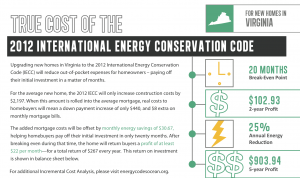
In the most recent State Energy Efficiency Scorecard, the American Council for an Energy Efficient Economy (ACEEE) ranked Virginia 28th in the country on building code regulations, and there is still considerable work to be done.
Currently, the only change to the 2012 residential amendments that has received support from the board is changing the requirement for high efficiency lamps in new homes from 50% to 75% (an improvement the DHCD board declined during the last cycle). VAEEC Governance Board member Andrew Grigsby of the Local Energy Alliance Program (LEAP), has two proposals before the board to require mechanical testing to measure residential building air-tightness and duct leakage (doing away with the visual inspection options). These proposals will be taken up at the next meeting on October 24th along with:
- Commercial energy codes: Maintaining current projection factors and Solar Heat Gain Coefficient (SHGC) formulas and declining weaker 2015 IECC specs for this element.
- Eliminating the credit for on-site generation in the Energy Rating Index compliance option.
- Increasing the requirement for exterior wall insulation from R15 (or R13 cavity + R1 insulated sheathing) to R20 (or 13+5).
Proposals that were voted out unfavorably at the September Codes and Standards Committee:
- Adopting the 2015 IECC without alteration
- updating the attic insulation requirement from R-38 to R-49 (per the 2012 IECC)
- Requiring that replacement windows meet minimum efficiency requirements when a permit is required (per the 2012 IECC)
- Removing an amendment allowing efficiency trade-offs in buildings with less fenestration (per the 2012 IECC)
 The Governor’s Executive Committee on Energy Efficiency has been presented data showing advanced building energy codes should be a vital component for Virginia to meet its goal to reduce energy consumption ten percent by 2020.
The Governor’s Executive Committee on Energy Efficiency has been presented data showing advanced building energy codes should be a vital component for Virginia to meet its goal to reduce energy consumption ten percent by 2020.
Everyone wins when new homes are built to the most cost-effective efficiency standards: consumers, builders, trades, grid operators, and society as a whole. This is why VAEEC continues to support rigorous energy codes.
Upcoming Important Dates:
10/24/16: DHCD board committee meets to approve or reject remaining proposals
11/21/16: DHCD Board meets to adopt draft proposal of new code regulations
Winter 2017: Draft regulations published in the Virginia Register for public comment
February-June 2017: Public comment period on draft regulations
6/19/17: Public Hearing on draft regulations
September and October 2017: DHCD board committees meet to vote on final regulations
November 2017: DHCD board adopts final code regulations
The full DHCD board timeline found here. Or check the DHCD website for details.
September 23, 2016
Chelsea Harnish, VAEEC Executive Director
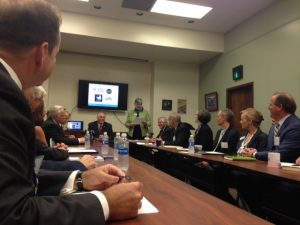 What an inspiring day at the Clean Energy Business Roundtable in Roanoke with Virginia Governor Terry McAuliffe. Plenty of VAEEC members were represented, including Community Housing Partners, Trane, Virginia Community Capital, Oracle (OPower), Appalachian Power and Siemens.
What an inspiring day at the Clean Energy Business Roundtable in Roanoke with Virginia Governor Terry McAuliffe. Plenty of VAEEC members were represented, including Community Housing Partners, Trane, Virginia Community Capital, Oracle (OPower), Appalachian Power and Siemens.
You can track some of the action via #NewVAEconomy.
A few things we heard from folks in the room:
- Governor McAuliffe kicked it off with a number of data-based arguments for energy efficiency and clean energy being cornerstones of the #NewVAEconomy, including: in 2013, the Clean Energy Census for Virginia found that clean energy- including wind, solar, EE, biomass and geothermal- was a $500,000 industry. Looking at preliminary results from our 2016 census, the revenue from this industry jumped to $2.1 billion with EE making up $1.2 billion (and the census is still open).
There was a story from the Roanoke Times that includes that first stat and some other highlights from the day.
- The cap for VA SAVES should be extended beyond $5M. Trane noted that school systems are looking to use this program, but the money will eventually run out. With the interest rate so low, schools could really do more with VA SAVES than current financing structure allows.
- Monica Rokicki with Better Building Works stated that a building-science based approach is critical for any renewable energy and energy efficiency policy decisions. We checked in with Monica after the event and got a bit more detail from her: “We have to factor in health and safety. For example, many clients think insulation is a good thing for energy efficiency in buildings. They are right except that if they don’t account for the fire hazards like air leakage at the tops of buildings or old knob and tube wiring, they are creating a very dangerous situation. Likewise, doing work without measuring before and after ventilation can create very bad air quality issues — making existing ones worse or even creating new ones. This is why independent third party verification by certified auditors is critical.” Plus, it ensures that the energy savings are on par with what we predicted.
- The Roanoke Chamber of Commerce (host of the event), emphasized the need for technical training in high schools. Many in the room agreed with this need and several stated that including facilities manager skills in these programs is key as many people in these positions are at or near retirement age with very few qualified candidates available to fill in.
- Oracle Utilities (OPower was recently purchased by Oracle), which operates worldwide, called for the Department of Mines Minerals and Energy (DMME) to get more involved in SCC proceedings.
- Community Housing Partners highlighted their workforce training programs and noted that baby boomers currently occupy a significant segment of energy-related jobs and they are starting to retire.
- Appalachian Power chimed in with the utility perspective that customers have a hard time paying their bills, so collaboration is key to ensure those who are already struggling don’t have to pay more.
A huge thanks for to the Roundtable participants for taking time out of their busy schedules to share their experiences and expertise and to Governor McAuliffe and his staff for joining and supporting the Commonwealth’s clean energy and energy efficiency industries.
We were proud to help organize the Clean Energy Business Roundtable with our partners at Advanced Energy Economy, AJW Consultants, Chambers for Innovation and Clean Energy (VAEEC member), U.S. Green Building Council (VAEEC member) and the Roanoke Regional Chamber of Commerce.
#NewVAEconomy @GovofVirginia
(June 28, 2016) Governor McAuliffe today issued Executive Order 57 directing Virginia Secretary of Natural Resources Molly Ward to convene a workgroup and recommend concrete steps to reduce carbon pollution from Virginia’s power plants. The group will evaluate options under Virginia’s existing authority to address carbon pollution. You can read the Governor’s press release here.
The following is the statement of Chelsea Harnish, VAEEC Executive Director:
“The Virginia Energy Efficiency Council applauds Governor McAuliffe’s announcement today on issuing Executive Order 57. Any plan to reduce carbon emissions should include strong energy efficiency policies. The Governor has been a champion of energy efficiency since taking office, which has been exemplified by his action to initiate the first-ever Governor’s Executive Committee on Energy Efficiency. Energy efficiency creates jobs, saves families and businesses money, and helps reduce pollution and carbon emissions — all benefits that the Commonwealth deserves from economic, energy and environmental initiatives like Executive Order 57.”
About the Virginia Energy Efficiency Council
The Virginia Energy Efficiency Council is a 501(c)3 organization seeking to provide a forum for stakeholder interaction and to assess and support programs, innovation, best practices, and policies that advance energy efficiency in Virginia.
 The recent election in Virginia had the highest voter turnout in two decades for a gubernatorial race (which occur in off-years) and brought the balance of power in the House of Delegates to a nearly even split between Republicans and Democrats. What does that mean for statewide energy efficiency policies and initiatives? As we continue to analyze the scenarios, we are actively engaging with the next Governor and his transition team.
The recent election in Virginia had the highest voter turnout in two decades for a gubernatorial race (which occur in off-years) and brought the balance of power in the House of Delegates to a nearly even split between Republicans and Democrats. What does that mean for statewide energy efficiency policies and initiatives? As we continue to analyze the scenarios, we are actively engaging with the next Governor and his transition team. VAEEC will continue to advocate for the Governor elect to build on the progress being made by Governor McAuliffe — who we recently honored with an Award of Excellence for his leadership and support of energy efficiency in the Commonwealth — on carbon regulations, which include a 5% carve out for EE programs.
VAEEC will continue to advocate for the Governor elect to build on the progress being made by Governor McAuliffe — who we recently honored with an Award of Excellence for his leadership and support of energy efficiency in the Commonwealth — on carbon regulations, which include a 5% carve out for EE programs.
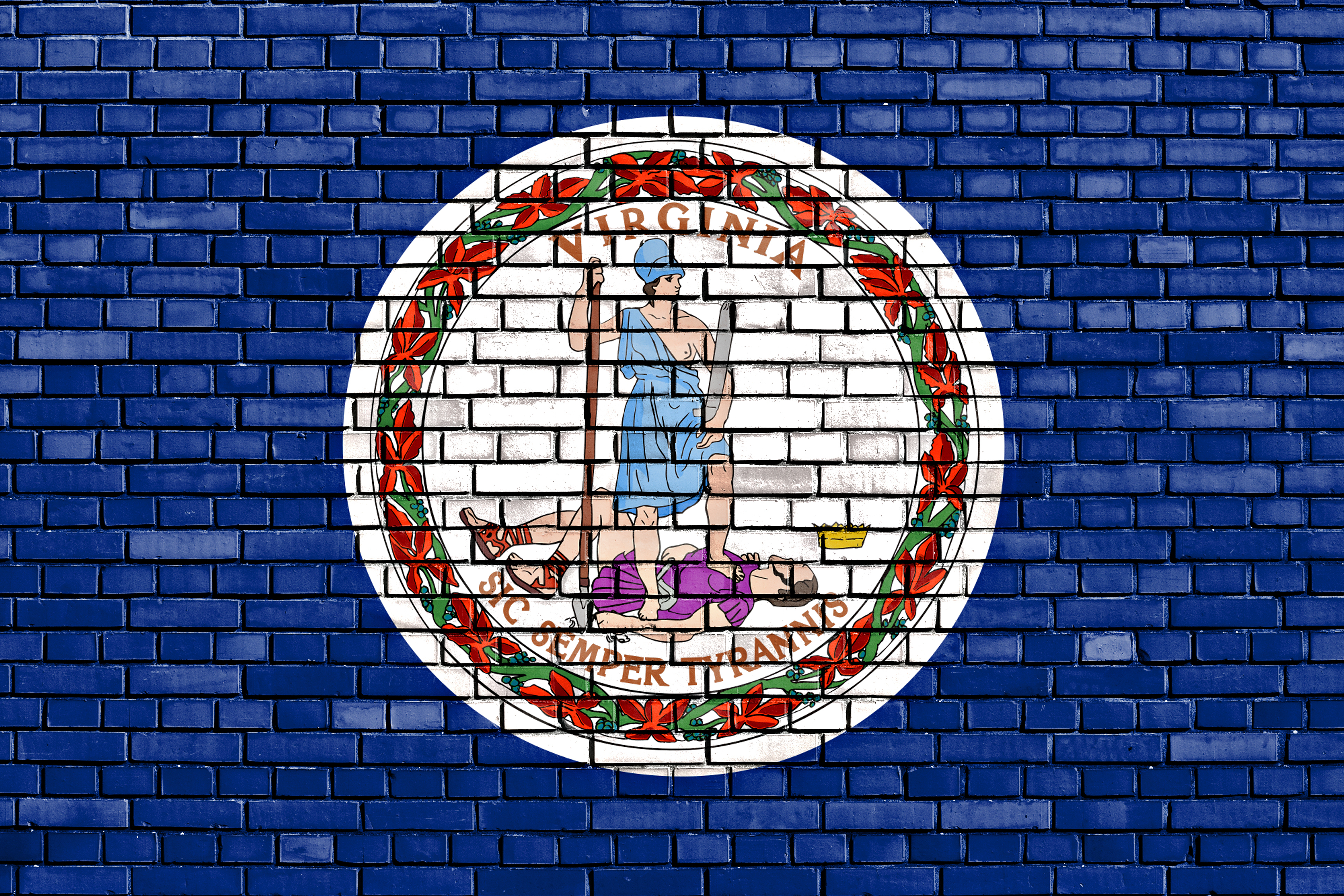
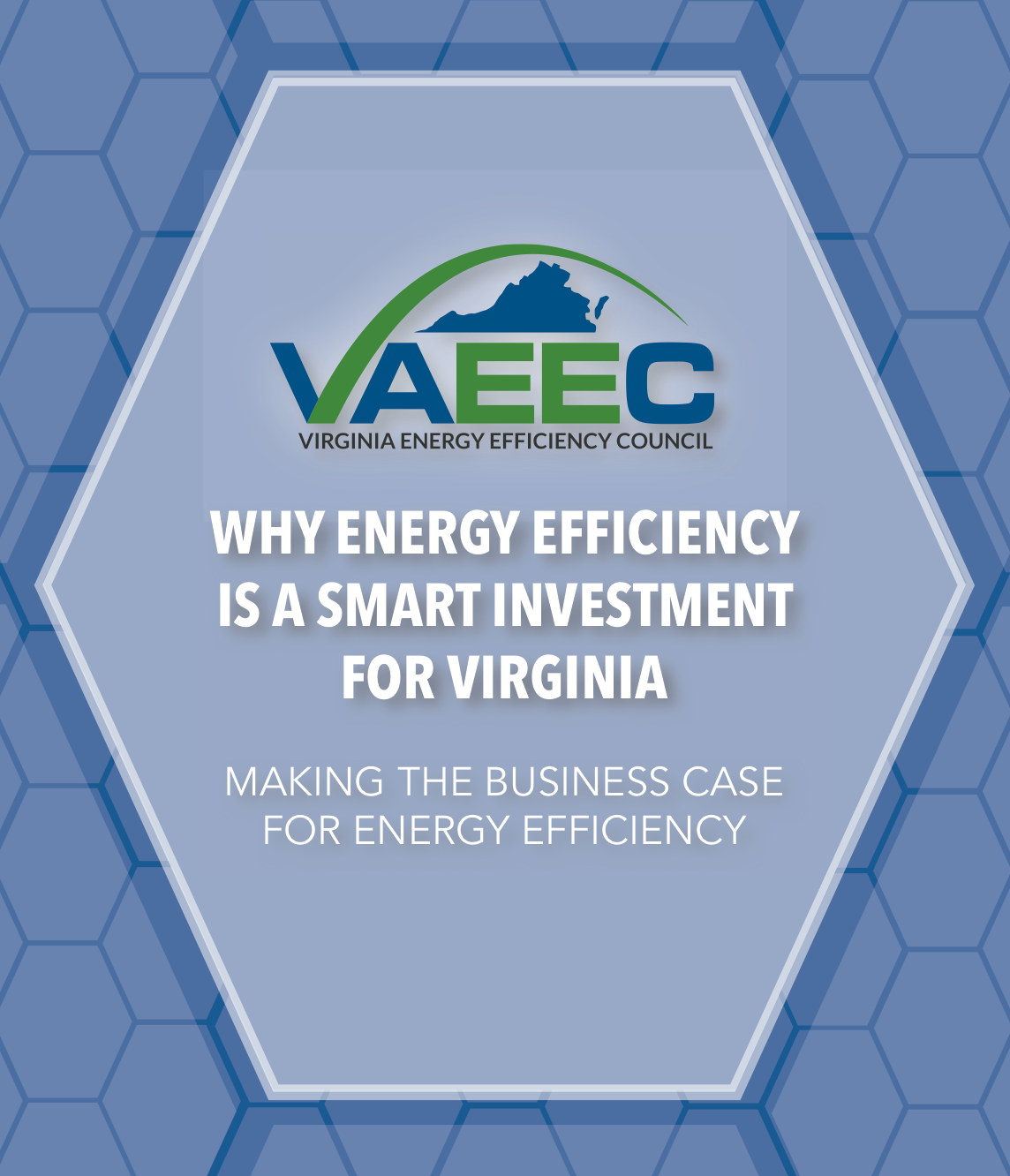
 On January 10, 2017, VAEEC and LEAP
On January 10, 2017, VAEEC and LEAP 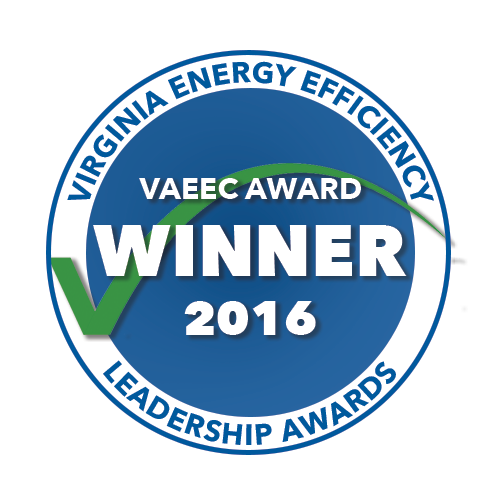
 Richmond, Virginia (November 29, 2016)
Richmond, Virginia (November 29, 2016) winners with their awards.
winners with their awards. The new Manassas Park Elementary School and Pre-Kindergarten were built with the goal to create a campus that was not only environmentally sustainable but that was also a resource to teach students about environmental stewardship. The buildings are designed to meet the American Institute of Architects (AIA) 2030 Challenge and use 50% less energy than code-compliant schools. Features include photo-sensors, which activate artificial light only when needed to supplement natural lighting; ground-source heat pumps, variable-speed pumping, pre-treatment and total energy recovery for ventilation air; natural ventilation; rainwater harvesting; low-consumption fixtures and kitchen equipment.
The new Manassas Park Elementary School and Pre-Kindergarten were built with the goal to create a campus that was not only environmentally sustainable but that was also a resource to teach students about environmental stewardship. The buildings are designed to meet the American Institute of Architects (AIA) 2030 Challenge and use 50% less energy than code-compliant schools. Features include photo-sensors, which activate artificial light only when needed to supplement natural lighting; ground-source heat pumps, variable-speed pumping, pre-treatment and total energy recovery for ventilation air; natural ventilation; rainwater harvesting; low-consumption fixtures and kitchen equipment. The team was largely responsible for fixing the flawed Property Assessed Clean Energy (PACE) legislation in 2015, which previously did not give the PACE lien priority over existing mortgage holders. Through their efforts, the PACE legislation passed easily – where previous years’ efforts to modify the statute failed – with very little opposition in the General Assembly. Since the legislation went into effect in July 2015, the team has been active in building interest, support and knowledge of the value proposition of PACE throughout the state.
The team was largely responsible for fixing the flawed Property Assessed Clean Energy (PACE) legislation in 2015, which previously did not give the PACE lien priority over existing mortgage holders. Through their efforts, the PACE legislation passed easily – where previous years’ efforts to modify the statute failed – with very little opposition in the General Assembly. Since the legislation went into effect in July 2015, the team has been active in building interest, support and knowledge of the value proposition of PACE throughout the state. The mission of Henrico County’s Energy Management program and energy manager is to develop Henrico County Government and Schools as the leading local authorities for sustainable energy use and to promote the importance of good energy management for the economic and environmental well-being of the county’s residents and employees. The Energy Management program also strives to improve energy education and foster a culture of efficiency and sustainability in the County, while the Energy Manager supports green design and construction efforts for capital projects. Completed projects include energy audits, HVAC and lighting system upgrades, participation in demand response programs, commissioning and retro-commissioning, traffic and street light upgrades, building automation systems, and construction of a 4-megawatt methane gas to electricity generator at the landfill.
The mission of Henrico County’s Energy Management program and energy manager is to develop Henrico County Government and Schools as the leading local authorities for sustainable energy use and to promote the importance of good energy management for the economic and environmental well-being of the county’s residents and employees. The Energy Management program also strives to improve energy education and foster a culture of efficiency and sustainability in the County, while the Energy Manager supports green design and construction efforts for capital projects. Completed projects include energy audits, HVAC and lighting system upgrades, participation in demand response programs, commissioning and retro-commissioning, traffic and street light upgrades, building automation systems, and construction of a 4-megawatt methane gas to electricity generator at the landfill. Community Housing Partners’ (CHP) innovative energy efficiency training project involved a live broadcast from a manufactured home in Virginia to the statewide Weatherization Assistance Program (WAP) conference in Minnesota. Having been a WAP provider for 40 years, CHP knows firsthand the importance of equipping WAP crew members with the knowledge, skills, and abilities to produce quality work resulting in maximum energy savings for the low-income households served by the program. CHP developed a 3.5 hour live-stream training session with relevant predefined topics and real-time Q&A, which enabled CHP to develop a new approach to energy efficiency training that will be replicated nationally, and potentially internationally.
Community Housing Partners’ (CHP) innovative energy efficiency training project involved a live broadcast from a manufactured home in Virginia to the statewide Weatherization Assistance Program (WAP) conference in Minnesota. Having been a WAP provider for 40 years, CHP knows firsthand the importance of equipping WAP crew members with the knowledge, skills, and abilities to produce quality work resulting in maximum energy savings for the low-income households served by the program. CHP developed a 3.5 hour live-stream training session with relevant predefined topics and real-time Q&A, which enabled CHP to develop a new approach to energy efficiency training that will be replicated nationally, and potentially internationally. Columbia Gas of Virginia’s Web-Based Home Audit Program allows residential customers to participate in their own energy analysis and places them in the “driver’s seat” of achieving an energy efficient future. Customers participating in an online home energy audit receive a customized report recommending home improvements that can be implemented to reduce natural gas usage. Through the end of 2015, CGV’s customers have achieved over $4M in savings through the program.
Columbia Gas of Virginia’s Web-Based Home Audit Program allows residential customers to participate in their own energy analysis and places them in the “driver’s seat” of achieving an energy efficient future. Customers participating in an online home energy audit receive a customized report recommending home improvements that can be implemented to reduce natural gas usage. Through the end of 2015, CGV’s customers have achieved over $4M in savings through the program. The Virginia Department of Corrections (VADOC) executed the first executive branch energy services contract (ESCO) in Virginia, leads Virginia in ESCO volume, and has embraced ESCOs as an integral part of its building renewal program. VADOC has also tied energy efficiency to its public safety mission by creating an inmate training program in energy sector skills. Additionally, VADOC employs a broad fuel portfolio including renewable and alternative energy sources
The Virginia Department of Corrections (VADOC) executed the first executive branch energy services contract (ESCO) in Virginia, leads Virginia in ESCO volume, and has embraced ESCOs as an integral part of its building renewal program. VADOC has also tied energy efficiency to its public safety mission by creating an inmate training program in energy sector skills. Additionally, VADOC employs a broad fuel portfolio including renewable and alternative energy sources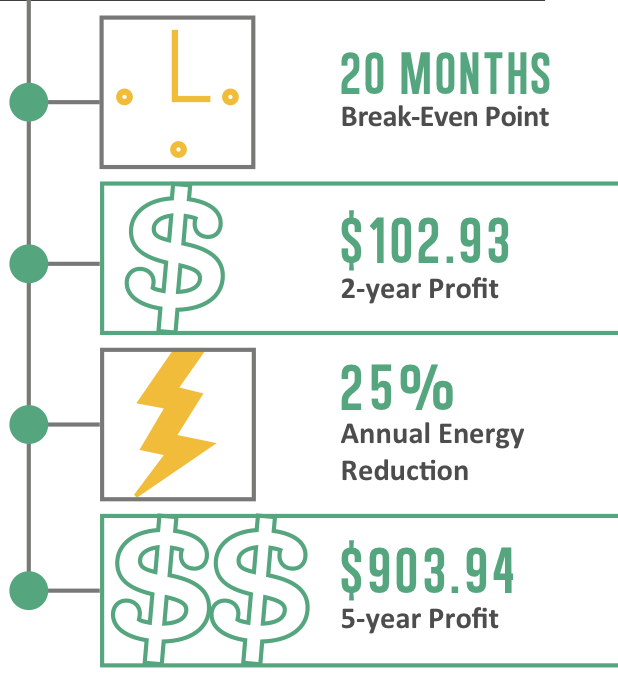
 The board is comprised of 14 members: 11 appointed members who represent Virginia’s congressional districts and three ex-officio members who represent the Virginia Housing Development Authority (VHDA); the Virginia Building Code Officials Association (VBCOA); and the Virginia Fire Services Board (VFSB).
The board is comprised of 14 members: 11 appointed members who represent Virginia’s congressional districts and three ex-officio members who represent the Virginia Housing Development Authority (VHDA); the Virginia Building Code Officials Association (VBCOA); and the Virginia Fire Services Board (VFSB).
 The Governor’s Executive Committee on Energy Efficiency has been presented data showing advanced building energy codes should be a vital component for Virginia to meet its goal to reduce energy consumption ten percent by 2020.
The Governor’s Executive Committee on Energy Efficiency has been presented data showing advanced building energy codes should be a vital component for Virginia to meet its goal to reduce energy consumption ten percent by 2020.
 What an inspiring day at the Clean Energy Business Roundtable in Roanoke with Virginia Governor Terry McAuliffe. Plenty of VAEEC members were represented, including Community Housing Partners, Trane, Virginia Community Capital, Oracle (OPower), Appalachian Power and Siemens.
What an inspiring day at the Clean Energy Business Roundtable in Roanoke with Virginia Governor Terry McAuliffe. Plenty of VAEEC members were represented, including Community Housing Partners, Trane, Virginia Community Capital, Oracle (OPower), Appalachian Power and Siemens.